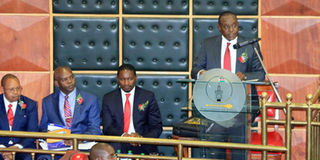How legislation, tax regime cull fastest growing babies

Treasury Cabinet Secretary Henry Rotich reads the 2017-2018 Budget speech at Parliament in Nairobi on March 30, 2017. FILE PHOTO | JEFF ANGOTE | NATION MEDIA GROUP
What you need to know:
- The irony is that the CS attributed the negative perception to lack of regulation.
- The proposed 50 per cent taxation beats business and taxation logic
- The betting industry is currently taxed at a rate of 7.5 per cent on gross profits.
The biggest shocker coming from this week’s Budget presentation was the Treasury Cabinet Secretary’s proposal to introduce a uniform 50 per cent tax across board on betting, lottery, gaming, and competition from the current rate of 7.5 per cent, 5 per cent, 12 per cent and 15 per cent respectively.
“Mr Speaker, betting and gaming have become widespread in our society in an environment that is inadequately regulated,” the Cabinet Secretary said, going ahead to stir emotions associated with the industry.
With that pronouncement, he delivered a sucker punch to the fastest growing industry. He set the stage for a debate that will whirl between logic (or lack of it) and emotion.
The irony is that the CS attributed the negative perception to lack of regulation. Of course, the gauntlet on regulation lies squarely at the doorsteps of the government.
Betting, gambling, competitions and gaming are not illegal. The law regulating the industry has been in existence since 1966.
Many Kenyans have participated in the industry through draws, sports betting or heavily publicised competitions. Indeed the famed Charity Sweepstakes lottery was a household name in the 1970s and 1980s with people from all walks of life trying their luck and winning.
EXPONENTIALLY GROWN
However, in the recent past the industry has exponentially grown especially on the back of sports betting.
The proposed taxation beats business and taxation logic. To slap a 50 per cent uniform tax on any business is like a death knell to the industry.
Let us take an example of sports gaming. The industry is currently taxed at a rate of 7.5 per cent on gross profits. The new proposal means it will be taxed half of its gross earnings before expenses and thereafter subjected to a further 30 per cent on net profit after deducting all other expenses.
Additionally, the industry is subjected to other statutory taxes. If adapted, the implications are clear.
On taxation, the proposal goes against that much-publicised counsel from the Kenya Revenue Authority. On February 21, KRA made a presentation to the National Assembly Committee on Labour and Social Welfare on the proposed Betting, Lotteries and Gaming (amendment) Bill fronted by Gem MP Jakoyo Midiwo.
The taxman stated that whereas there will be an increase in Exchequer revenues the benefit may be short-lived depending on the elasticity of demand of the service. KRA demonstrated that high tax rates for commodities considered as socially undesirable ultimately lead to reduced demand.
It also abets the development of an underground economy and promotes tax evasion. The tax authority recommended the enhancement of the rate from 7.5 per cent to 15 per cent, bringing Kenya in line with two African countries: Rwanda (13 per cent) and Ghana (17.5 per cent).
EIGHT MAJOR PLAYERS
The KRA Domestic Taxes data base has eight major players in the betting sector with a total revenue paid and payable amounting to Sh4.7 billion. It is, therefore, perplexing that the Treasury has chosen to kill the goose by introducing nearly 1,000 per cent increase in taxation.
In what will be a further twist of the knife, the heavy taxes proposed will not only kill the local, tax compliant companies but will drive them offshore. Equally, international betting companies’ platforms are accessible from Kenya. This will promote an illegal bookmaking industry. Bookmakers take bets, calculate odds and payoff any winnings. This will create yet another monster that is difficult to regulate.
The Betting Control and Licensing Board, through its parent ministry, has drawn up regulations, sought input from the stakeholders and engaged with the office of the Attorney-General to ensure that the regulations are aligned with the country’s laws.
PROTECT THE VULNERABLE
The regulations, if approved, shall apply to both online and mobile bookmaking, lotteries, casinos, and short message services games and promotions.
The regulations are aimed at protecting society from the over-hyping of the demand for gambling; protect young and vulnerable in society from the negative effects of gambling; promote the development of a responsible gambling, betting and gaming and prevent the sector from being used in money laundering.
To cap the shocking uniform tax proposal was the pronouncement that the proceeds from the tax will be put in a newly created National Sports, Culture and Arts Fund. Some of the betting firms have demonstrated the benefits of sports sponsorship better than a newly created, bureaucratic institution.
Today, SportPesa sponsors the national rugby team, two of the leading football clubs and the Kenyan Premier League.
The writer is a commentator on socio-economic issues




